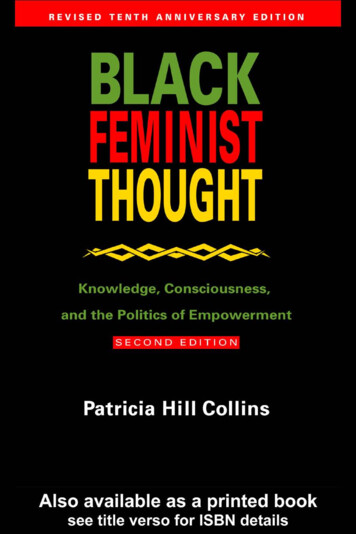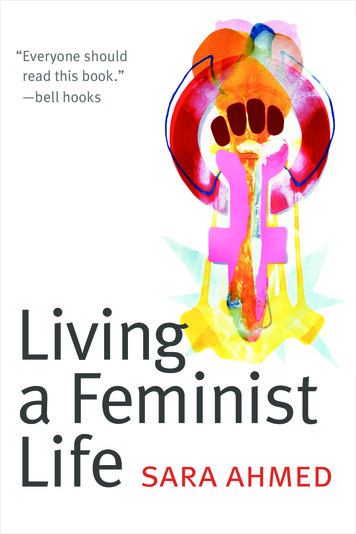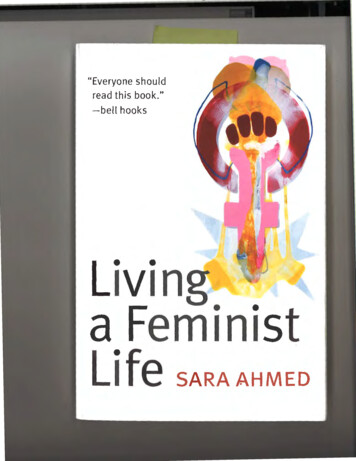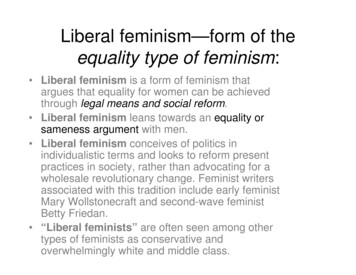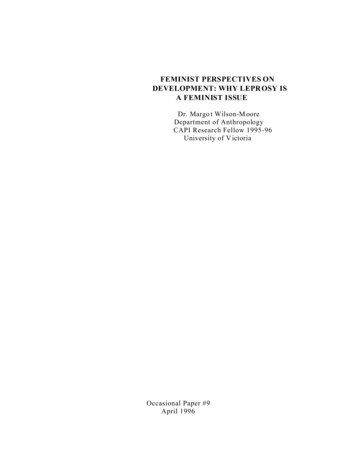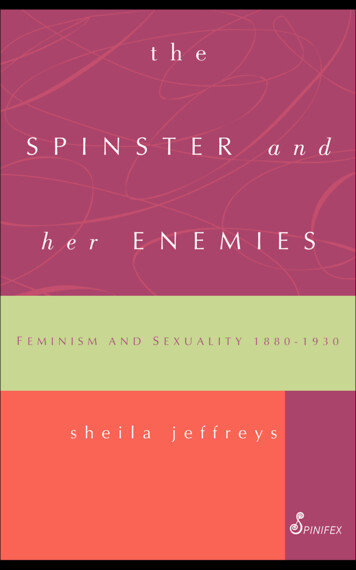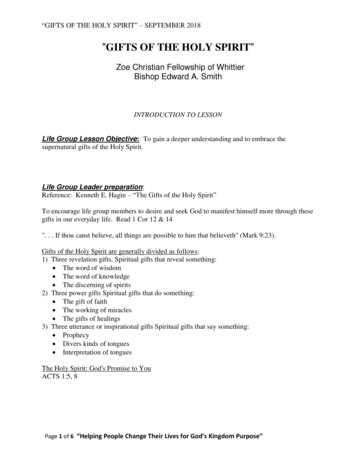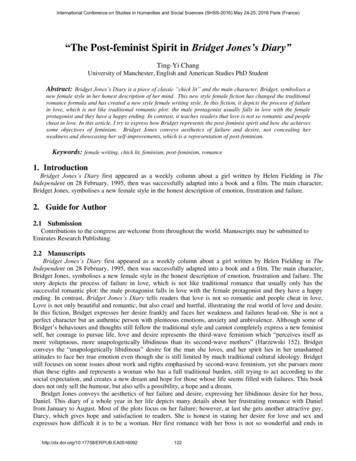
Transcription
International Conference on Studies in Humanities and Social Sciences (SHSS-2016) May 24-25, 2016 Paris (France)“The Post-feminist Spirit in Bridget Jones’s Diary”Ting-Yi ChangUniversity of Manchester, English and American Studies PhD StudentAbstract: Bridget Jones’s Diary is a piece of classic “chick lit” and the main character, Bridget, symbolises anew female style in her honest description of her mind. This new style female fiction has changed the traditionalromance formula and has created a new style female writing style. In this fiction, it depicts the process of failurein love, which is not like traditional romantic plot: the male protagonist usually falls in love with the femaleprotagonist and they have a happy ending. In contrast, it teaches readers that love is not so romantic and peoplecheat in love. In this article, I try to express how Bridget represents the post-feminist spirit and how she achievessome objectives of feminism. Bridget Jones conveys aesthetics of failure and desire, not concealing herweakness and showcasing her self-improvements, which is a representation of post-feminism.Keywords: female writing, chick lit, feminism, post-feminism, romance1. IntroductionBridget Jones’s Diary first appeared as a weekly column about a girl written by Helen Fielding in TheIndependent on 28 February, 1995, then was successfully adapted into a book and a film. The main character,Bridget Jones, symbolises a new female style in the honest description of emotion, frustration and failure.2. Guide for Author2.1 SubmissionContributions to the congress are welcome from throughout the world. Manuscripts may be submitted toEmirates Research Publishing.2.2 ManuscriptsBridget Jones’s Diary first appeared as a weekly column about a girl written by Helen Fielding in TheIndependent on 28 February, 1995, then was successfully adapted into a book and a film. The main character,Bridget Jones, symbolises a new female style in the honest description of emotion, frustration and failure. Thestory depicts the process of failure in love, which is not like traditional romance that usually only has thesuccessful romantic plot: the male protagonist falls in love with the female protagonist and they have a happyending. In contrast, Bridget Jones’s Diary tells readers that love is not so romantic and people cheat in love.Love is not only beautiful and romantic, but also cruel and hurtful, illustrating the real world of love and desire.In this fiction, Bridget expresses her desire frankly and faces her weakness and failures head-on. She is not aperfect character but an authentic person with plenteous emotions, anxiety and ambivalence. Although some ofBridget’s behaviours and thoughts still follow the traditional style and cannot completely express a new feministself, her courage to pursue life, love and desire represents the third-wave feminism which “perceives itself asmore voluptuous, more unapologetically libidinous than its second-wave mothers” (Harzewski 152). Bridgetconveys the “unapologetically libidinous” desire for the man she loves, and her spirit lies in her unashamedattitudes to face her true emotion even though she is still limited by much traditional cultural ideology. Bridgetstill focuses on some issues about work and rights emphasised by second-wave feminism, yet she pursues morethan these rights and represents a woman who has a full traditional burden, still trying to act according to thesocial expectation, and creates a new dream and hope for those whose life seems filled with failures. This bookdoes not only sell the humour, but also sells a possibility, a hope and a dream.Bridget Jones conveys the aesthetics of her failure and desire, expressing her libidinous desire for her boss,Daniel. This diary of a whole year in her life depicts many details about her frustrating romance with Danielfrom January to August. Most of the plots focus on her failure; however, at last she gets another attractive guy,Darcy, which gives hope and satisfaction to readers. She is honest in stating her desire for love and sex andexpresses how difficult it is to be a woman. Her first romance with her boss is not so wonderful and ends inhttp://dx.doi.org/10.17758/ERPUB.EA0516092122
International Conference on Studies in Humanities and Social Sciences (SHSS-2016) May 24-25, 2016 Paris (France)betrayal by her boss, who marries “a bronzed giantess” (Fielding 181). At that time, she is still working in thesame office and needs to face other people’s comments, and some people even mistakenly congratulate her.Facing failure and frustration highlights Bridget Jones’s spirit: the courage to embrace failure and the power tostart a new life. The image that she portrays seems funny, ridiculous and a little bit silly. Is this a character whocan express feminist or post-feminist thoughts? The answer is yes. Bridget has achieved some goals of secondwave feminism, having a job to support herself independently and the ability to enjoy the urban variety ofworking people. Bridget’s weakness and self-improvements represent post-feminism. According to Mazza, postfeminism is “the logical next stage of feminism: time to look closely at ourselves, to admit our weakness as wellas celebrate strengths; to honestly assess what we’ve helped make ourselves into, rather than only blaming thepatriarchal world and to explore all the other facets and types of experiences besides our oppression” (111).Mazza’s argument tries to lead feminism to move on to the next stage; however, there are some points that arenot completely persuasive. Second-wave feminism is not just “blaming the patriarchal world” and does not justfocus on “oppression”. The methods and some of the logos that second-wave feminism employs are strong andprovocative, methods that attract the attention of the public and inspire more people. It is indeed true, however,that post-feminism is “the logical next stage of feminism”, although it does not mean that feminism hasdisappeared. In contrast, post-feminism will be a new form to express feminism more clearly and in a morefriendly way to the public.A main difference between second-wave feminism and third-wave feminism or post-feminism is that thirdwave feminism and post-feminism emphasise “individual accounts” which “grapple with how to combine someversion of feminist politics with the lived messiness of real life” (Braithwaite 336). Bridget Jones’s Diary andmany chick lit works in the post-feminist writing style employ “individual accounts” and focus on more personaldetails rather than the collective and activist style of second-wave feminism. The focus on individual life is awriting style that can provide a more authentic depiction of females’ life and struggle, leading readers to judgeand comment on feminist spirit unconsciously. This confessional writing style can deconstruct desire. Desire isusually fluid, and the writing style in chick lit seems to be just messy description in the detailed descriptions inthe process of some romantic relationships, yet in fact this style expresses the true images of desire. In this diary,Bridget expresses her unstable emotions honestly and shows her clear expectations regarding her boss, Daniel.This is the expression of desire, which has set up the female sexual autonomy with her own agency. Bridgetmight fail in love, yet she does not fear failure. Her anxiety seems personal, although it might be the collectiveanxiety as well. Like second-wave feminism, the personal can be the political, and the confessional writing canbe a way to depict universal anxiety.In this text, Bridget represents many of the reasons for female anxiety, including work, relationships andappearance. In this diary, Bridget worries constantly about her weight and appearance, expressing high anxietyabout her appearance. Bridget states: “I am a child of Cosmopolitan culture, have been traumatized bysupermodels and too many quizzes and know that neither my personality nor my body is up to it if left to its owndevices” (Fielding 59). The whole cultural atmosphere pushes people to pursue a single standard of beauty.Bridget’s anxiety reflects the fact that women’s anxiety in this era has not been limited to the pursuit of equalitybetween men and women, and the new war belonging to women has been developed. Cosmopolitan culture isjust one part of this fashion war effect, and there are various magazines and media creating endless pursuits andstandards for women. The power of beauty is a post-feminist issue, and Bridget’s anxiety reflects the struggle ofwomen. From the perspective of second-wave feminism, women can choose not to care about their appearanceso much and just focus on their ability. In order to compete in the new capitalist society, appearance has becomea power.Beauty is a power; however, the celebration of a sexy and eroticised body is criticised by many feminists,who think that the pursuit of beauty goes back to the previous phase, the women’s movement of the 1960s and1970s. From my perspective, it seems that the pursuits of beauty in contemporary society and before the 1960sare similar, yet in fact they are totally different. Without economic independence, the pursuit of beauty wasmainly a tool to attract a man with great economic ability to support her future, and the beauty here was anobject gazed on by others. The beauty in the post-feminist phase has changed this, turning the objectification ofbeauty into subjectification. Beauty in the post-feminist era empowers women, endowing women with morepower and more freedom to choose and to express their own sexual autonomy. Most of the chick lit femaleprotagonists, such as Bridget Jones, are full of desire, and appearance is one key factor affecting their power toenjoy the man or woman they desire. Some female characters in literary history have innate beauty and sexyhttp://dx.doi.org/10.17758/ERPUB.EA0516092123
International Conference on Studies in Humanities and Social Sciences (SHSS-2016) May 24-25, 2016 Paris (France)attraction, and it seems that they do not need to make an effort to be attractive and can have power. BridgetJones, however, being an ordinary and average girl, needs to make an effort to have more power to choose and topursue what she wants.In Bridget Jones’s Diary, there is a vivid description of her struggling to be a woman. As Bridget puts it,“Being a woman is worse than being a farmer – there is so much harvesting and crop spraying to be done: legs tobe waxed, underarms shaved, eyebrows plucked, feet pumiced, skin exfoliated and moisturized, spots cleansed,roots dyed, eyelashes tinted, nails filed, cellulite massaged, stomach muscles exercised” (Fielding 30). Themetaphor of being a farmer represents that being a woman is no longer just a gender issue, and it has become ajob or even a career, and that women need to develop and take care of their career continuously. The ‘harvest’ isnot necessarily good, which symbolises the burden of patriarchy and many traditional expectations from thewhole of society. To be a modern women, it is necessary to do much work to cleanse and exercise their body,and they need to fight continuously against the deep-rooted social ideology. Social expectations such as marriageor having children are like the hair on the body, which never stops growing, so women need to eliminate them.When Bridget complains that “being a woman is worse than being a farmer”, she expresses her profound anxiety,yet at the same time she also enunciates the power to express anger and emotion. She has freedom to choose notto undertake these body-care rituals and can be as ‘natural’ as she wants; however, she refuses to do that and sheeven complains a lot about its complicated methods. She still wants to be more attractive and sexy, whichempowers her. Her appearance affects not only her relationships, but also her career in an indirect way.Appearance reconstructs a self-recognition, and this self can express power if the appearance indeed affects thisperson’s confidence.Endless self-improvement is Bridget’s feature. The fact that she records her daily calorie intake, checks herweight and makes resolutions constantly reflects her eagerness to have an ideal self. Bridget usually worriesabout many things, yet she does not give up becoming a better self, which is her aesthetics of failure. Herfailures do not create a gloomy atmosphere; in contrast, they bring power, hope and fun. When Bridget facesdifficulties, she attributes her failure in love to her fat figure. In fact, her figure is still in an average and normalrange compared to the whole of British society. Believing that she is fat is the result of comparison, as whenBridget sees Daniel’s fiancée, according to Bridget, her reaction is: “‘Honey,’ said the woman, in an Americanaccent, looking over my head at him. ‘I thought you said she was thin’” (Fielding 178). Bridget’s frustration herereflects the fact that the enemy of women might sometimes not be men, but women. This woman’s satirical tonehurts Bridget considerably, making her feel even more stressed and anxious about her appearance. This dialoguereflects the fact that sometimes Bridget cares about her own figure more than her relationships. She attributes herfailure in love to her fat figure, and she thinks that it is “because I am too fat” (Fielding 181). In the descriptionin the fiction, she does not care much about Daniel’s details and cares about her calorie intake more. Viewingthese from another perspective, Bridget focuses on her self more than the object loved by her, which fullyexpresses her strong subjectivity.Really loving someone is a process of losing self. Having a relationship means abandoning a part of self andrebuilding a new self with the partner. When Bridget loves Daniel deeply, she usually seems to lose herself, yetshe never stops talking to herself. In her many dialogues with herself, she tries to retain her original andcomplete self. Second-wave feminism has led women to think and act for their rights and their independence;however, there is not enough theory to tell women how to deal with the emotion, desire and conflict with selfwhen they fall in love. In the post-feminist discussion, there are more discussions about women’s self and desire,encouraging women to pursue their own desire. Without self-deception, Bridget honestly faces her own desireand her body, totally facing her real self despite the fact that it is so imperfect and filled with flaws. After sheexperiences some frustrations in relationships, she feels that “the only thing a woman needs in this day and ageis herself” (Fielding 286). This “herself” seems so ironic and only appears after her failure. The self afterexperiencing failure, however, is a brand new self. Failure creates awakening, providing a good opportunity tothink about the self and to know what it wants. By experiencing various failures and loss, Bridget becomes moreindependent and learns how to cherish what she wants.In The New Feminism, Walter celebrates the fact that feminism has brought Bridget Jones independence,stating that Bridget can “dress in a trouser suit and leave her hair loose”, “sit alone in bars without a secondthought” and “pay for my drink with my own money that I earn from my own work” (254, 255). Most ofBridget’s independence lies in her own financial ability, so she can enjoy her free time drinking in bars. Her“trouser suit” image is one of her main features, conveying that she can adopt a casual and relaxed style to facehttp://dx.doi.org/10.17758/ERPUB.EA0516092124
International Conference on Studies in Humanities and Social Sciences (SHSS-2016) May 24-25, 2016 Paris (France)her life. It is no longer the elegant style of the successful woman image represented by the media, and Bridgetexpresses an ordinary girl’s power. This positive image is still weighed down by a lot of anxiety, however.Bridget is still pondering the best way to lead her life. Although she seems to have many good friends and theyare like “extended families in the form of networks connected by telephone” (Fielding 245), she is still usuallyworried that she might die alone one day. This relates to a question about what happens after feminism: whenwomen have economic independence and more equal rights, what is their next step to have their own life?Bridget’s condition represents this question and refers to the point that post-feminism needs to think more aboutwhat happens after second-wave feminism. Marriage has not been the only choice for women after feminism, yetwhat kind of a new lifestyle can really satisfy women? Bridget’s anxiety about this situation illustrates thatwomen might not necessarily need marriage and that a relationship or a network with others still plays a crucialrole in a person’s life.Fielding employs a funny yet ironic writing style to present the feminism issue in Bridget Jones’s Diary,leading readers to think about feminism while they enjoy reading the fiction. Bridget’s contradictory attitudesregarding feminism can be post-feminists’ arguments with the previous feminism. When Darcy asks Bridgetwhich book she has read recently, she answers, ‘Backlash’ by Susan Faludi “triumphantly” (Fielding 14). In fact,she has not “exactly read it as such”, and she thinks that it is a “completely safe option as no way a diamondpattern-jumpered goody-goody would have read a five-hundred-page feminist treatise” (Fielding14). The “fivehundred-page feminist treatise” has an ironic tone to show that reading some feminist theory books might bechallenging for most readers, yet they still like to say that they have read them even though they did not, whichillustrates that feminism can give women some knowledgeable images. This is also an objective of postfeminism, trying to make feminism become a part of women’s daily life instead of just a theory in academia orsome social protest activities. When Bridget states that she has read Backlash “triumphantly”, at this moment sheacknowledges that being a feminist is a symbol of wisdom. When she faces Darcy, a lawyer, she employs‘feminism’ as a tool to make her appear more knowledgeable. At this moment, feminism is no longer a bad orunattractive tag for a girl and it can even be a point that makes this girl more attractive. It is a little silly to usefeminism to appear wise, yet it represents that a feminist image can be a positive image rather than a completelynegative and aggressive image.When Bridget has some confused feelings about her relationship, she adopts another attitude to face feminismand expresses her contradictory thoughts. She feels that “there is nothing so unattractive to a man as stridentfeminism” (Fielding 20). When she uses the word “strident”, this reflects some stereotypes of feminism andpeople’s fixed prejudice against feminism. Criticisms about feminism are that it is too aggressive and tooextreme. Bridget is affected by men’s gaze and thoughts, which plays a part in women’s attitudes aboutfeminism, and this is a point that previous feminism has not discussed very much. Second-wave feminism hastaught females how to be independent, yet it has not taught females how to be with men, especially as there isnot much discussion about female desire. This desire includes both bodily and emotional desire. Second-wavefeminism indeed liberates women in many ways, and Bridget can express the result of second-wave feminism’sefforts: girls can earn their own money, buy their own drinks, live in their own flats and enjoy their own life.They have more and more choices, which enables them to enjoy their colourful and happy life. They are still notliberated in some parts, however, including their emotional problems and their fear of loneliness, which might benot only a feminism problem, but also an existentialism problem. Existentialism relates to the problem of beingand subjectification, as does post-feminism.As Gill and Arthurs state, “the basic themes of popular post-feminism include the shift from female sexualobjectification to subjectification, the emphasis on self-surveillance and self-improvement, choice andempowerment, and a celebration of consumerism” (446). Empowerment and emancipation are familiar feministterms, liberating women from patriarchal oppression. Bridget’s sexual freedom and agency are examples of thechange from female sexual objectification to subjectification. Bridget fully expresses her sexual subjectificationin her honest description of her desire for Daniel. During her romantic relationship with Daniel, she expressesher desire and her anxious happiness when flirting with Daniel, which reveals some partially true images of loveand desire. Sexuality and the female body are part of the traditional feminist critique. In contrast, post-feministsembrace this issue and celebrate female sexuality, encouraging women to have an attractive body. Some postfeminists “adroitly undermine feminism by dismissing feminism as obsolete, old and out of fashion, whileseeing themselves as the new trend that speaks to and is embraced by a younger generation of women who havegrown up in a climate of female emancipation and material prosperity” (Chen 265). Negating previous 125
International Conference on Studies in Humanities and Social Sciences (SHSS-2016) May 24-25, 2016 Paris (France)completely is a dangerous approach to create a new feminism. A new trend is indeed a power, yet it cannot belimited to the younger generation, which is a big problem of post-feminism as well. Post-feminism indeedpresents some issues that are more suitable for the new era of capitalism. The line between patriarchy andmasculine attractiveness might be obscure. One reason why previous feminism had some criticism aboutsexuality was to liberate females from patriarchy. When post-feminists try to deal with this issue again, it doesnot mean that they want to go back to the patriarchal ideology. After breaking patriarchy, are women reallyliberated? What post-feminists want is to find a new way to really ‘emancipate’ women in the background of‘material prosperity’.In this material prosperity society, Bridget has achieved many goals of feminism and expressed her ‘singleton’spirit. Bridget’s friend teaches her to answer the question about why she is not married, saying that “you shouldhave said ‘I’m not married because I’m a Singleton, you smug, prematurely ageing, narrow-minded morons’”(Fielding 42). To Bridget, girls can still follow the traditional way of choosing marriage, yet being a “singleton”is another choice in life. Bridget’s spirit does not refuse love but seeks it, which can make her feel that she liveshappily and energetically. Her mother also expresses classical feminism. Even though she is not young and ismarried, she still has much power and freedom to express her subjectivity. When Bridget’s mother wants toconsole Bridget when she loses out in love, she says: “Now come along, darling. Brace up. Back to sleep. Gointo work looking drop-dead gorgeous. Leave no one – especially Daniel – in any doubt that you’ve thrown himover and suddenly discovered how marvellous life is without that pompous, dissolute old fart bossing youaround and you’ll be fine” (Fielding 182). This funny tone is a typical style in this fiction that employs ahumorous way to convey some serious thoughts. When Bridget’s mother uses the word “fart” to symbolise men,this is part of the feminism spirit, breaking the hegemony of men. “Bossing you around” implies the patriarchalpressure. As girls can realise the unstable condition of desire, they can find the “marvellous” part in life.Bridget’s mother also expresses the important points of post-feminism, such as “Go into work looking drop-deadgorgeous”. Work and beauty develop female subjectivity. With subjectivity, girls can love, lose love and start anew life. They can embrace diversified choices in relationships, including exclusive or open relationships,marriage or any possible relationship.Relationships have many possibilities in the new urban society, and they are not wholly exclusive and mightbe very open and changeable. When Sharon asks her colleague, Alex Walker, if a stunning blonde is hisgirlfriend, he answers, “‘Well. Huh. You know, she thinks she is, but we’re not going out, we’re just sleepingtogether. I ought to stop it really, but, well ’ he said smugly” (Fielding 21). Desire is fluid and the boyfriendgirlfriend relationship is not the only way to enjoy sex. The love relationship is not usually equal between twopeople as love is not equal. Whilst this girl thinks that she is Alex’s girlfriend, Alex does not think so, whichillustrates that people cannot control how much they love others and how much they can get back from them. Inthis dialogue, it could be true that the blonde girl loves Alex profoundly and thinks that he is her boyfriend. It isalso possible that the condition is just Alex’s imagination, and both of them are still considering theirrelationship. In the chick lit era, many girls just want to sleep with men and do not want a stable relationship.The post-feminism effect has aroused some masculine anxiety. Many men think that they are like productschosen by girls. This can be seen as part of the success of feminism, in which women are empowered andbecome like men with more choices.Economic ability empowers women and gives them the confidence to assert their rights. The character in thistext identified as a feminist is Bridget’s friend Shazza, who states that “We women are only vulnerable becausewe are a pioneer generation daring to refuse to compromise in love and relying on our own economic power. Intwenty years’ time men won’t even dare start with fuckwittage because we will just laugh in their faces”(Fielding 21). Shazza’s words display the process of feminism’s effort and the result. When this “pioneergeneration” begins to employ their “economic power”, women still criticise their efforts. These women “refuseto compromise in love”, reflecting the typical feminism discourse and that economic ability is the basis of afemale career. It does not deal with the issues of female sexual desire and sexuality. The post-feminists do notwant to go back to “compromise in love”. What post-feminist wants is to pursue, to negotiate and to be happierin love. When Shazza uses “fuckwittage” to imply male opposing voices regarding feminism, this funny wordironically expresses female unsatisfied feelings. Women have the ability to laugh at men, and at the same timehave the ability to laugh at women.According to Chaudhuri, the author of a review of Bridget Jones’s 6
International Conference on Studies in Humanities and Social Sciences (SHSS-2016) May 24-25, 2016 Paris (France)Fielding is unrepentant about not addressing feminism more robustly. She protested last weekend that itwas unfair to lambast her creation for its lack of feminist perspective: "It's a comic novel – nobodyworries what Bertie Wooster is saying about masculinism. Women are very good at laughing atthemselves among themselves. If we're not confident enough to laugh at our shortcomings in public, wehaven't got very far at being equal, have we?"Fielding herself does regard this fiction as a feminist work, defining it as a “comic novel” and believing thatlaughing at women’s shortcomings is a beginning to talk about equality. From Fielding’s perspective, womenlaughing at themselves is a direct way to face women themselves, especially as when women have courage tolaugh at their flaws, they have more space for improvement. When they can face their situation honestly, theycan identify what they already have and what they need to pursue. It is not very obvious feminist fiction, whichis not a bad thing. It can lead more non-academic female readers to read this genre and not feel that they arereading feminism books. This work’s power lies in its popularity, and many similar writers have started tofollow this trend. I personally do not agree completely with Chaudhuri’s comment on this fiction. She classifiesthis book as a missed opportunity, “a chance to examine feminism’s legacy. Why, when our mothers andgrandmothers had fought so hard to get us rights, were we squandering those golden opportunities by sittingaround in wine bars crying about our inability to find Mr Right”? In my opinion, women are not squandering thegolden opportunities by drinking in bars. Bars are new symbols of liberation, reflecting that drinking is not just amen’s activity. When these girls discuss their relationships in bars, these behaviours are like men’s discussionand analysis about women, and nowadays women have rights and interests in comparing and choosing men.These girls do not waste the rights fought for by their mothers and grandmothers, and they use these rights tocreate the most opportunities in their life.Fielding evokes some problems of the post-feminist generation and seeks solutions for them. In this fiction,she represents many results of the feminism effort and employs some failures of Bridget Jones to express thepost-feminists’ focus on girls’ desire and sexuality. Ultimately, Bridget still has a happy ending, having afantastic job and getting a good guy, Darcy, which gives hope to people struggling in love. Her past failure in therelationship with Daniel and previous boyfriends leads to her self-improvement and she becomes more mature,more courageous to pursue the life she wants. This female Bildungsroman examines the inner voice and thedesire of women. Feminism fights for rights and equality, and post-feminism fights for desire, subjectivity andmore than just equality. Feminism focuses on successful experiences, whereas post-feminism deals with failuresand encourages self-improvement and growth following failures. Feminism thinks that the female body is a toolgazed at by men in patriarchy, whereas post-femi
2.2 Manuscripts Bridget Jones's Diary first appeared as a weekly column about a girl written by Helen Fielding in The Independent on 28 February, 1995, then was successfully adapted into a book and a film. The main character, Bridget Jones, symbolises a new female style in the honest description of emotion, frustration and failure. The


